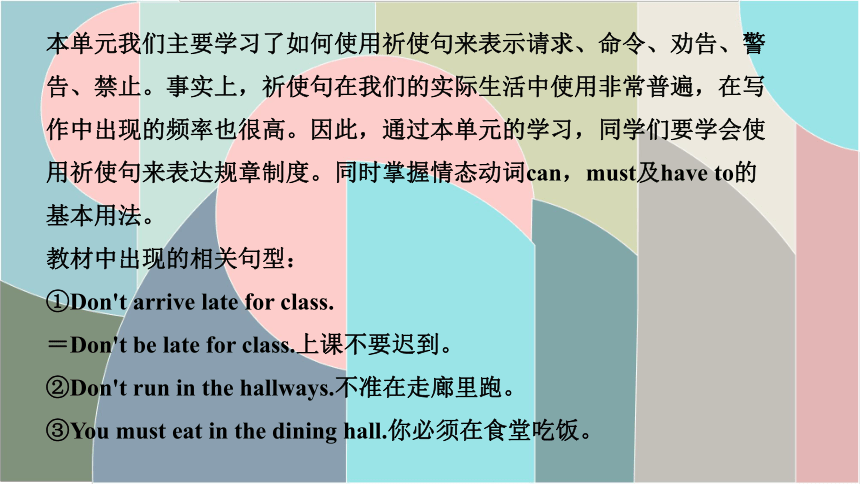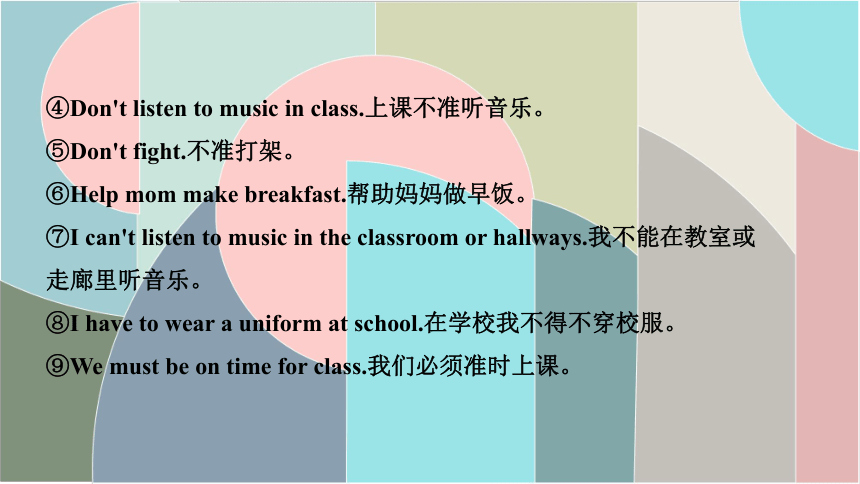Unit 4 Don't eat in class第六课时Section B (3a-3c)单元同步作文指导课件9张
文档属性
| 名称 | Unit 4 Don't eat in class第六课时Section B (3a-3c)单元同步作文指导课件9张 |  | |
| 格式 | ppt | ||
| 文件大小 | 143.0KB | ||
| 资源类型 | 教案 | ||
| 版本资源 | 人教新目标(Go for it)版 | ||
| 科目 | 英语 | ||
| 更新时间 | 2022-04-10 16:36:04 | ||
图片预览




文档简介
(共10张PPT)
第六课时 Section B (3a 3c)
—单元同步作文指导
本单元我们主要学习了如何使用祈使句来表示请求、命令、劝告、警告、禁止。事实上,祈使句在我们的实际生活中使用非常普遍,在写作中出现的频率也很高。因此,通过本单元的学习,同学们要学会使用祈使句来表达规章制度。同时掌握情态动词can,must及have to的基本用法。
教材中出现的相关句型:
①Don't arrive late for class.
=Don't be late for class.上课不要迟到。
②Don't run in the hallways.不准在走廊里跑。
③You must eat in the dining hall.你必须在食堂吃饭。
④Don't listen to music in class.上课不准听音乐。
⑤Don't fight.不准打架。
⑥Help mom make breakfast.帮助妈妈做早饭。
⑦I can't listen to music in the classroom or hallways.我不能在教室或走廊里听音乐。
⑧I have to wear a uniform at school.在学校我不得不穿校服。
⑨We must be on time for class.我们必须准时上课。
Tina是你校新来的一名学生,不了解你校的规章制度,请你根据以下提示向她介绍一下。
提示:1.上课不能迟到;
2.不许在教室里吃东西;
3.不许在课堂上听音乐、玩游戏;
4.图书室里要保持安静;
5.不能在走廊里跑;
6.不能打架。
要求:60词左右。
Welcome to our school,Tina.Here are some of our school rules.Let me tell you.We can't arrive late for class.We can't eat in the classroom,but we can eat in the dining hall.We can't listen to music or play games in class,either.We must be quiet in the library.We can't run in the hallways and we mustn't fight.
无规矩不成方圆,生活中总有各种规则约束着我们。英语课上,老师要求大家谈一谈家规。假如你是王燕,请你根据以下提示和要求,完成一篇英语短文,介绍你的家规,并在课堂上与同学们分享。
提示:1.What rules do you have in your family
2.What do you think of these rules
3....
要求:1.句子通顺、语意连贯、语法正确;
2.包含对所有问题的回答,可适当发挥;
3.不少于60词(开头已给出,不计入总词数)。
There are many rules at my home.
In_the_morning,
I_can‘t_get_up_late.Then_I_have_to_make_my_bed.After_breakfast,I_need_to_do_the_dishes_sometimes.From_Monday_to_Friday,I_can’t_watch_TV_or_play_computer_games_in_the_evening.I_can_relax_on_weekends,
but_I_can't_go_out_at_night.My_parents_always_say_these_rules_are_important_for_me.I_think_these_rules_are_strict_but_useful_for_me.
病号1:Not run in the hallways.
【处方】该句为祈使句的否定形式。当祈使句的主语为第二人称时,主语通常省略,其否定形式直接在动词原形之前加Don't。故原句中的Not应改为Don't。
病号2:Don't listen music in class.
【处方】listen为不及物动词,意为“听”,其后若接宾语,则必须加介词to,构成listen to sb./sth.。故原句中的listen应改为listen to。
单元常见错误诊断
病号3:When did you arrive school
【处方】arrive为不及物动词,意为“到达”,后接宾语时要接介词in或at,in后接大地方,at后接小地方。故原句中的arrive应改为arrive at。
病号4:David practices to_play the piano every day.
【处方】practice意为“练习”,后接名词、代词或动词 ing形式作宾语,意为“练习(做)某事”。故原句中的to play应改为playing。
第六课时 Section B (3a 3c)
—单元同步作文指导
本单元我们主要学习了如何使用祈使句来表示请求、命令、劝告、警告、禁止。事实上,祈使句在我们的实际生活中使用非常普遍,在写作中出现的频率也很高。因此,通过本单元的学习,同学们要学会使用祈使句来表达规章制度。同时掌握情态动词can,must及have to的基本用法。
教材中出现的相关句型:
①Don't arrive late for class.
=Don't be late for class.上课不要迟到。
②Don't run in the hallways.不准在走廊里跑。
③You must eat in the dining hall.你必须在食堂吃饭。
④Don't listen to music in class.上课不准听音乐。
⑤Don't fight.不准打架。
⑥Help mom make breakfast.帮助妈妈做早饭。
⑦I can't listen to music in the classroom or hallways.我不能在教室或走廊里听音乐。
⑧I have to wear a uniform at school.在学校我不得不穿校服。
⑨We must be on time for class.我们必须准时上课。
Tina是你校新来的一名学生,不了解你校的规章制度,请你根据以下提示向她介绍一下。
提示:1.上课不能迟到;
2.不许在教室里吃东西;
3.不许在课堂上听音乐、玩游戏;
4.图书室里要保持安静;
5.不能在走廊里跑;
6.不能打架。
要求:60词左右。
Welcome to our school,Tina.Here are some of our school rules.Let me tell you.We can't arrive late for class.We can't eat in the classroom,but we can eat in the dining hall.We can't listen to music or play games in class,either.We must be quiet in the library.We can't run in the hallways and we mustn't fight.
无规矩不成方圆,生活中总有各种规则约束着我们。英语课上,老师要求大家谈一谈家规。假如你是王燕,请你根据以下提示和要求,完成一篇英语短文,介绍你的家规,并在课堂上与同学们分享。
提示:1.What rules do you have in your family
2.What do you think of these rules
3....
要求:1.句子通顺、语意连贯、语法正确;
2.包含对所有问题的回答,可适当发挥;
3.不少于60词(开头已给出,不计入总词数)。
There are many rules at my home.
In_the_morning,
I_can‘t_get_up_late.Then_I_have_to_make_my_bed.After_breakfast,I_need_to_do_the_dishes_sometimes.From_Monday_to_Friday,I_can’t_watch_TV_or_play_computer_games_in_the_evening.I_can_relax_on_weekends,
but_I_can't_go_out_at_night.My_parents_always_say_these_rules_are_important_for_me.I_think_these_rules_are_strict_but_useful_for_me.
病号1:Not run in the hallways.
【处方】该句为祈使句的否定形式。当祈使句的主语为第二人称时,主语通常省略,其否定形式直接在动词原形之前加Don't。故原句中的Not应改为Don't。
病号2:Don't listen music in class.
【处方】listen为不及物动词,意为“听”,其后若接宾语,则必须加介词to,构成listen to sb./sth.。故原句中的listen应改为listen to。
单元常见错误诊断
病号3:When did you arrive school
【处方】arrive为不及物动词,意为“到达”,后接宾语时要接介词in或at,in后接大地方,at后接小地方。故原句中的arrive应改为arrive at。
病号4:David practices to_play the piano every day.
【处方】practice意为“练习”,后接名词、代词或动词 ing形式作宾语,意为“练习(做)某事”。故原句中的to play应改为playing。
同课章节目录
- Unit 1 Can you play the guitar?
- Section A
- Section B
- Unit 2 What time do you go to school?
- Section A
- Section B
- Unit 3 How do you get to school?
- Section A
- Section B
- Unit 4 Don't eat in class.
- Section A
- Section B
- Unit 5 Why do you like pandas?
- Section A
- Section B
- Unit 6 I'm watching TV.
- Section A
- Section B
- Review of Units 1-6
- Unit 7 It's raining!
- Section A
- Section B
- Unit 8 Is there a post office near here?
- Section A
- Section B
- Unit 9 What does he look like?
- Section A
- Section B
- Unit 10 I'd like some noodles.
- Section A
- Section B
- Unit 11 How was your school trip?
- Section A
- Section B
- Unit 12 What did you do last weekend?
- Section A
- Section B
